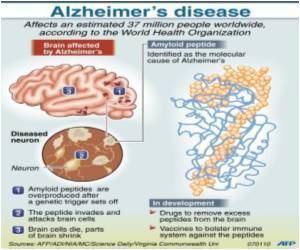
Called Sirtuin1 in humans, that same enzyme seems to enhance memory and nerve-cell development in the brain as well, according to the new findings, published in the peer-reviewed journal Nature.
The work could provide leads for drugs to combat Alzheimer's and other debilitating neurological diseases, the researchers said.
A team led by Li-Huei Tsai, director of the neurobiology programme at MIT in Boston, had earlier demonstrated that Sirtuin1 boosts neuron survival in mice genetically modified to mimic certain degenerative brain disorders.
"We have now found that SIRT1 activity also promotes memory and plasticity," Tsai said, referring to the ability of healthy brain cells to interconnect.
"This result demonstrates a multi-faceted role of SIRT1 in the brain, further highlighting its potential as a target for the treatment of conditions with impaired cognition."
Advertisement
Compared to normal mice, they reacted poorly to electrical stimulation in the hippocampus, which is critical to long-term memory and spatial navigation. In Alzheimer's, the hippocampus is one of the first regions in the brain to be damaged.
Advertisement
Finally, they were less able to discriminate old from new objects in memory tests.
"SIRT1 deficient mice are impaired in all three memory paradigms compared to control mice," Tsai explained in an email.
The study also unveiled a previously unknown mechanism: by keeping certain gene regulators called mircoRNAs in check, the SIRT1 gene allows the memory-enhancing proteins to be expressed.
The results are preliminary, Tsai cautioned, adding that is was still too early to design clinical trials with humans.
The study did open up the intriguing possibility that Sirtuin1 enzymes could one day be used to turbocharge memory and brain function even in healthy people, she acknowledged.
"Activation of sirtuins can be mildly beneficial in humans," she said.
Recent research suggests that the gene and the enzymes it produces are part of a feedback system that enhances cell survival during times of stress, especially a lack of food.
Source-AFP










